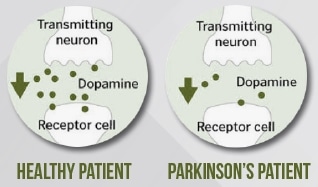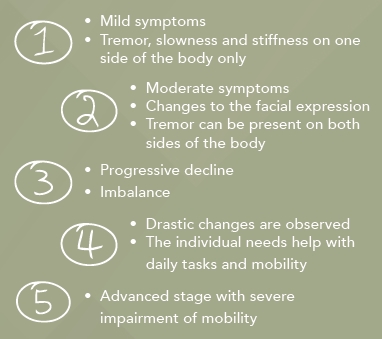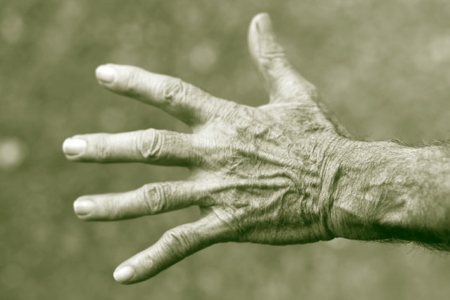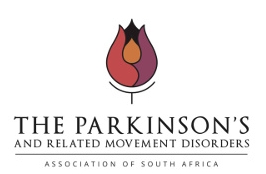Parkinson’s Disease


RISK FACTORS
Family history
Exposure to chemicals, pesticides and toxins
History of serious head injury
SIGNS AND SYMPTOMS
- Shaking
- Slow movement
- Muscle stiffness
- Stooped posture
- Imbalance
- Impaired unconscious movements, such as blinking and arm swing
- Speech difficulties
- Struggling to write
- Swallowing and sphincter control problems may occur late in the disorder.
- Reduced sense of smell
- Constipation
- Decreased mobility
- Reduced facial expression
STAGES


DIAGNOSIS
Usually diagnosed by a neurologist (a specialist trained in the nervous system) based on medical history, physical examination and symptoms.
Other disorders can be ruled out with the help of specialised scans and ultrasounds.
Sometimes medication intended for PD is given and an improvement in the symptoms confirms the diagnosis.
POSSIBLE COMPLICATIONS
- Pneumonia
- Injuries from falling
- Choking
- Depression
- Sleep disturbances
- Dementia
TREATMENT
These medications are usually designed to increase the amount of dopamine in the brain either by replacing it, mimicking its action, or increasing its amount by inhibiting its breakdown.
In cases of advanced PD, brain surgery has proved to be beneficial.
Specialised physiotherapy, occupational therapy and speech therapy may assist.
Following a healthy lifestyle and exercising is recommended.
In some cases, supporting medication for other symptoms, such as depression, reduced concentration, impaired bladder control and bowel control, pain and spasms may be required.
Avoid leaning and rather distribute weight evenly between the feet
Always walk forwards and never backwards
Watch where you are going
Avoid carrying heavy things that can throw you off balance and/or obscure your view of where you are stepping
WHAT OTHER CONDITIONS RESEMBLE PARKINSON’S DISEASE?
A condition resembling PD is referred to as Parkinsonism. This can be caused by other neurological conditions as well as stroke and encephalitis (inflammation of the brain).
PREPARING FOR YOUR DOCTOR’S APPOINTMENT
If you suspect that you may have PD and have booked an appointment with your doctor, do the following prior to the appointment:
Make a list of all the medication that you are taking – prescription and non-prescription
Keep written track of all the symptoms that you are experiencing so that your doctor can go through them with you
Make notes of recent life changes, stresses, injuries or accidents that you need to share with your doctor
Ask a family member or friend to accompany you
Make notes of the questions that you might have for your doctor
HOW TO COPE
Stay informed about the disease and new developments in treatment but watch out for all the masses of false information.
Have regular follow-ups with your doctor
Exercise is very important and one of the few things that can change the course of the disorder.
Build support through family, friends and joining a local PD support group.
WHAT TO EXPECT

Related Brochures

dementia

depression
